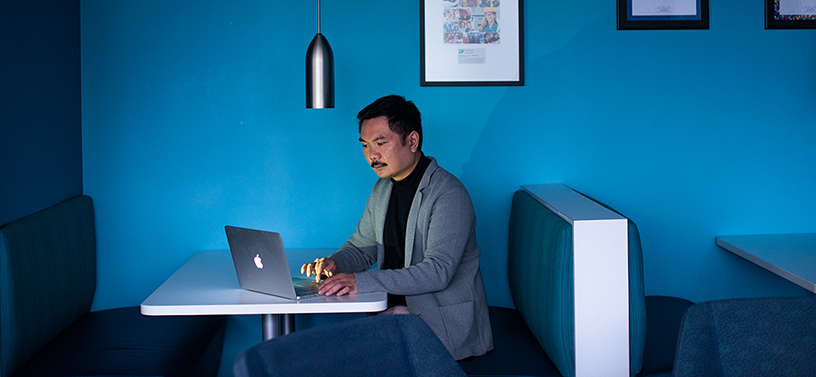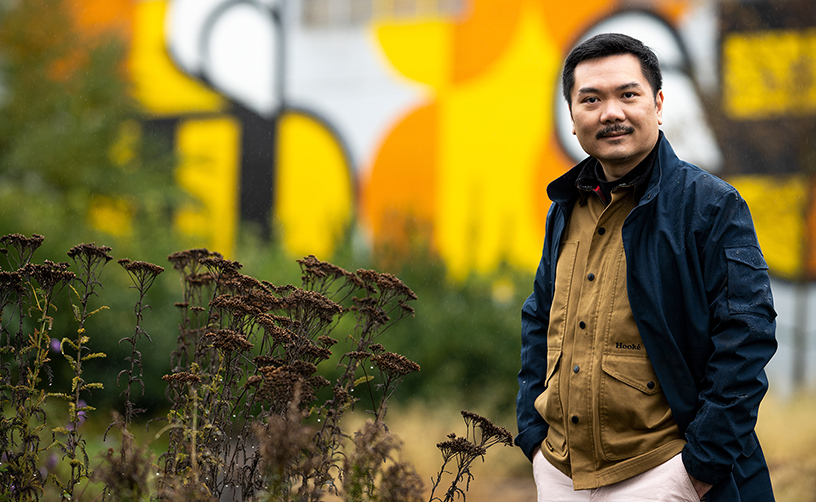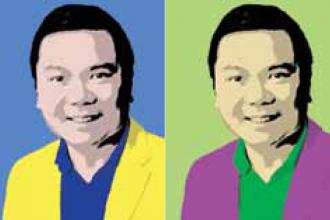Dr Matthew Chow: Exploring new avenues for effecting change
Dr Chow, a child and adolescent psychiatrist in Vancouver and the new president of Doctors of BC, shares his interests, influences, concerns, and hopes for the year ahead.

Dr Chow was bestowed the chain of office and became president of Doctors of BC on 11 December 2020. He spoke with BCMJ editor Dr David Richardson that same month.
You’re kind of a unicorn right now, as a child and adolescent psychiatrist. There aren’t many of you.
Sadly, no, there aren’t enough of us.
Where did you grow up?
I’m from the Prairies, from Calgary. I went to the University of Calgary for undergrad and for med school.
What did you like to do growing up?
What wasn’t I interested in? I was definitely a voracious reader. And I grew up at a time when more and more electronic stuff was coming online, so I got into computer programming pretty seriously and video games and things like that. And at one point I had quite an interest in IT, but I ended up liking biology more. I did cellular, molecular, and microbial biology in my undergrad and then ended up going into medicine.
And I hear you’re a cyclist? How many bikes do you have?
Hahaha. I have only one, believe it or not.
Do you know the formula for how many bikes you need? It’s N plus one, where N is the current number. What bike do you have?
I have a steel-frame Marinoni bike from Quebec. It’s a road bike with fenders, because you need fenders to ride in this city all season, and I’m an all-season rider.
Do you also ride on a trainer?
I can’t do it. I have to be outside when I ride. It’s my quiet time. My alone time. It’s thinking and recharging time.
 I feel the same way. So, in university, thinking about going into medicine, when did you get interested in psychiatry?
I feel the same way. So, in university, thinking about going into medicine, when did you get interested in psychiatry?
It was last minute and probably caused my dean to have a heart attack. I had no interest in psych, so I made it my last possible rotation. I had my heart set on applying for other things. When I did the rotation it was surprisingly interesting. It gave me time to spend with patients that I didn’t have elsewhere during my training. I ended up changing gears and I remember walking into the associate dean’s office and saying, “You know what, I’ve decided that I want to apply to psych now.” And he responded, “CARMS is next week. You’re supposed to be flying around the country doing interviews right now.”
I ended up being on hastily arranged psych electives as I was flying around for CARMS interviews, so I had to explain that to people. But I think people could see I was genuinely interested in it, so it worked out very well. I went to UBC for my general psych training and did some additional work so I also have my subspecialty designation for child and youth.
Why child and youth?
The more I progressed in the arc of my medical career the more I realized that you have to get upstream of a problem before it starts. In general psych I’d see people with substance use, psychosis, really intractable depression, and I’d wonder what things would have looked like if I had met them when they were 15 or 10 or 5 years old. Or if I’d met their parents before they were conceived. I found that for a lot of the problems people experience with ill health, other things are going on in their lives that you can help deal with. So I’ve gone more and more upstream—from general adult psychiatry to child and youth psychiatry, then from child and youth psychiatry to health systems work with Doctors of BC.
How do we get more specialists with your training? It’s such a huge problem; in Langley, there’s nobody.
I wish I had a straightforward answer for you, but it’s the same as asking, How do you solve the full-service family medicine shortage? The answer is that it’s complicated.
On this specific issue I don’t think we’re ever going to have enough child and adolescent psychiatrists if we keep practising the way that we traditionally do. I can see only so many patients a day. If you do the math we would need to train dozens of new child psychiatrists just to meet demand in BC, and we only train a handful a year. We’ve also compartmentalized things to such an extent that you have a certain number of eating-disorder specialists, OCD specialists, mood disorder specialists, etc., and that impacts how we deliver general psychiatric care. I think part of the solution is that we have to work differently. There aren’t enough of us to go around, so we can’t practise and carry individual caseloads like we did in the 1950s. I need the support of social workers and psychologists and dietitians and all sorts of people. Trying to do it all yourself, you just get burned out. I’m speaking to a generalist, so these are not surprising things for me to be telling you, right?
One of our office managers did the psych LPN course, and she loves it, so she spends part of her time talking to our patients—youth and adolescents. It’s invaluable what she does. I can’t do that. In Langley, we don’t have any general psychiatrists in private practice anymore, because, I think, they got paid so poorly. It just makes sense for them to do contract work at mental health or to do a contract here or there.
I’m not surprised at that statistic. When the Joint Collaborative Committees put out the COVID-19 grant to doctors who are responsible for their own office costs, 80-something psychiatrists responded. But there are hundreds of psychiatrists in the province. Very few of them are running their own offices anymore.
It’s probably simplistic, but if we came along with bags of money as an incentive for people to be psychiatrists in private practice, that would probably do it. That’s not going to happen, but that would probably do it.
We see that problem time and again; we try to fix one problem by adjusting incentives one way, but then we create a new problem. We need more hospitalists; okay, let’s pay hospitalists really well. Oh no, now we don’t have enough full-service family doctors in the community. Or we pay episodic care so much or emerg care so much, and all of a sudden we don’t have enough full-service family doctors. For a while there weren’t enough psychiatrists willing to work in hospitals so the fees for hospital-based work were hiked. It caused an exodus from outpatient practice that is still causing problems for us today.
So Matthew, how old are you?
I’m 38.
Okay, I’m 57, and when I started medical school, they were making medical schools smaller to try to save costs, and after a while we were graduating 120 medical students, whereas Alberta had 200. Eventually, what do you know, we don’t have enough doctors. It was pretty shortsighted.
It’s funny, the skills that you bring to the table as a generalist, as a longitudinal practitioner, we need that skill set in the health care system. When we look at things on a short-term basis—say a 4-year cycle—we inevitably succumb to fads like cutting medical school spots and then have to live with the consequences. Someone who takes a longitudinal approach would look at the whole system, the whole arc of where society is headed, where our demographics are going, how many older and aging people we have. We’d look at the complexity of the situation and think, what we actually need is a more comprehensive generalists.
Having been in general practice for 30 years, I’ve been through a couple of generations of the same families and seen patterns repeat themselves. I also think to myself, if I could have intervened or something could have happened at an earlier stage, it may have stopped this sort of generational recurrence. Your specialty is so necessary.
I think about the young mother who has to quarantine with her toddler in a tiny apartment after an exposure to COVID, with no family or friends to help, or the child who has to change schools every semester because they keep getting pushed out of their community by rising rents, or the trans individual who tried to kill themselves because their parents won’t accept who they are. They come to me with depression, anxiety, PTSD, but it’s clear that the problems started long before they met me, and that they weren’t mental health problems.
I think that’s very true. There are so many situational issues of poverty and housing and substance abuse. Where do you start? And what’s the solution?
That problem vexes me as well. It’s a wicked, wicked problem—the Downtown Eastside, homelessness, the opiate crisis, these things are linked. Even seemingly unrelated factors such as the obscene escalation of home prices in BC has an impact. A researcher from Portugal was invited to BC to comment on the opiate crisis and he made the link right away between rising housing costs, homelessness, and opiates. I see the connection too. I have patients who are recruited to build multimillion-dollar condos that they will never be able to afford. They feel pressure to work excessive hours, get injured, use opiates to relieve the pain, and end up overdosing alone. This points to solutions that go beyond health care. It has to be a collaborative approach across many sectors.
What drew your interest to medical politics?
The same thing as child psychiatry—the need to get upstream of the problem. I’ve worked at almost all the health authorities in this province; I’ve gone through the privileging and credentialing process multiple times, and I saw a lot frustrating things about medicine, about practice, and I wanted them to change.
So the president’s job. Why now?
Well, someone asked me to do it. And because I think Doctors of BC means something. It represents, I think, a noble profession. During this pandemic we’ve learned that the type of leadership doctors provide is needed now more than ever before. I think what’s unique about us is that we have science, we have evidence, but we’re also experts in humanity. We understand human beings, we understand what drives people’s behavior. We have empathy. You need that during a pandemic. I would say that you need that for a lot of the ills that plague society. And, for me, it was an opportunity to get more involved in a meaningful way in our noble profession, and in the association that represents the profession.
How do you think we’ve done (BC doctors and Doctors of BC) during the pandemic?
I’ll start with the doctors, as that’s easy: they’ve acquitted themselves brilliantly. No one saw this coming, and yet people behaved superbly in terms of stepping up to the plate, learning what needed to be learned, doing what needed to be done under extraordinarily difficult conditions.
Doctors of BC has stepped up as well. When this really hit the fan in March, I remember us texting each other, emailing each other, back and forth with the ministry. We wrote submissions that became policy and facilitated changes nearly overnight. Virtual care became a fully billable service within 48 hours of WHO declaring a global pandemic. We had to make sure the health care system did not collapse. Collaborative work with government for the past decade or more paid off in a span of mere days.
As a primary care practitioner, I thank you. Virtual care was huge for us. What do you think about the public health response and collaboration with government?
I think very highly of our public health officials. They are quintessential professionals. They have trained and worked their entire lives for this moment. I have a great deal of respect for them, and I think they’ve been brilliant. Our politicians in BC have respected the public health advice, science, and evidence, too; it cannot be overstated how important that is. If you look at other jurisdictions where politicians tried to second-guess their public health officials, they got burned.
Thinking about your year as president, what would you like to accomplish and what legacy would you like to leave?
It’s important to me that the profession not only survives this pandemic, but thrives. This is a once-in-a-lifetime, maybe once-in-a-century opportunity. We’ve learned a lot, and we’ve learned about the gaps that we have in the medical system, in society. We’ve also seen certain folks take on a disproportionate burden during this pandemic; we need to learn from that; we need to do better. And I think we will. I think society will be along with us for that. I would also like to see doctors see and treat each other as cherished colleagues long after the pandemic is over.
I think you’re right. That’s gotten lost a little bit, perhaps less so in smaller communities.
I did some of my training in rural communities, I’ve done outreach and worked in rural communities, and I admire the collegiality between people there. In the city we have a lot more difficulty with that.
Assuming the pandemic dies down, what would you like your legacy project to be?
During the pandemic, doctors’ well-being has taken a serious hit. I want to make sure we can support doctors who have experienced physical, psychological, and moral injuries during this pandemic. It’s an important part of the pandemic recovery process. We mustn’t leave anyone behind.
What do you think the biggest challenge is for Doctors of BC in the years to come?
I think the nature of medicine is changing. Our younger colleagues don’t want to work the same way that previous generations have. And contrary to some folks’ opinion, it’s not because they are lazy. They’re working multiple part-time jobs, they’re working in different settings, they’re teaching, they’re doing research, they’re doing advocacy, they’re getting involved in politics. They are attacking things like systemic racism, gender inequality, and climate change. They are an incredibly engaged group. Medicine is going to have to change and the association is going to have to change to recognize that.
How about technology? What technological advances are going to affect the doctors of BC?
Virtual care has completely changed the face of medicine during COVID-19, and it’s here to stay; patients are saying they want it to stay. That’s something we have to adapt to, and Doctors of BC wants to help practices adapt to that virtual care reality.
The vaccine that we’re all going to get, wow, that’s amazing. We’re injecting mRNA into people so they can express a protein so you can raise an immune reaction against this virus, and we did that in a year. And there are all sorts of other things you can do with that technology.
And genomics, that’s going to change medicine. It’s going to make medicine more precise, but it will also raise some interesting questions—who pays for that, who has custody over that information, do insurance companies get to see it?
We live in interesting times, no question, and as president during this time you will represent a wide range of people—medical students, residents, family doctors, specialists. How will you balance everyone’s different interests effectively?
You have to be a good listener in this job. I feel that my job is to be the chief listener, to understand everyone’s reality, and to reflect it to our partners, our stakeholders, the government. A lot of listening and a lot of humility are necessary to function in this role.
It’s a good thing you’re a psychiatrist.
Thinking about the next phase of the pandemic, it’s kind of a psychiatry problem now. Now we have a vaccine, but we still have to convince people that it is safe and that they should take it. At the same time we have to convince people that even though we have a vaccine they still need to wear masks and physically distance and follow the other public health measures. It’s a behavioral problem that we have to deal with, which is right up my alley.
It’s so true. I’ve noticed in my patient group that “COVID fatigue” is creeping in and people are thinking, well, we’ve got a vaccine, so we can relax.
That’s going to be the story of the first part of my presidency—how do we convince people to hold on for a few more months. If we let up too soon there will be a resurgence.
Are there any experiences you’ve had with patients that stand out as having a significant influence on your career?
There are so, so many. Some of the most poignant experiences have been when I’ve been up north, in rural communities. I remember going to an Indigenous village, driving along a single-lane dirt road, with CB radios because we had to listen for logging trucks that we couldn’t see coming around the blind corners. Serving the patients in that community and being faced with the reality that so many of our Indigenous brothers and sisters face every day, being struck by the challenges that have to be overcome. The people themselves are resilient, but the system and the things around them, and the history has led to so much of the illness and despair. That was powerful for me.
How about a pivotal moment in your career?
I applied to join a leadership course at one point, and I had no business being with the other people in that course—they were CEOs, past presidents of their provincial medical associations, and even a former special forces solider. My application was rejected, so I emailed Allan Seckel and asked him, “What could I have done differently?” He sent me a very lovely and generous reply and basically said, “There’s nothing wrong with your application. It’s just that a lot of very qualified people applied.”
Later it turned out that someone was not able to go to the course, and I got the call that they had space for me. I met the most amazing people, and it completely changed the trajectory of my career. I realized there was a different avenue to effecting change. It was completely different from anything I’d done in clinical medicine, and I loved it.
Speaking of inspiring people that you meet, what traits do you most admire in a colleague?
Colleagues who have empathy. Colleagues who can walk a mile in another person’s shoes. I admire people who can be transparent and give you great feedback, but also be civil and respectful about that—rather than hurting someone they are able to lift them up.
That’s definitely a skill, and when you see it in somebody, it’s impressive. What’s the best advice you were ever given?
One of my preceptors said, “At some point in your life it’s going to be up to you to decide how much of what I’m teaching you is worth listening to, and when to go your own way.” He told me to follow my heart and trust my decision-making capability and my experience; to let people guide me, but not to let people direct me.
The other piece of advice someone gave me is to remember that you’re always replaceable. Doctors have a tendency to put their maximum effort into everything they do because that’s the kind of people they are, which is really cool. People come to rely on us. That’s why I like being a doctor. That’s why I like being with other doctors. But no one is truly irreplaceable.
I think that’s true. It’s a good thought to keep you humble. What do you hope to take away from being president, personally?
I started my career in medicine in a tiny corner of the huge thing called health care, and I saw only my little corner, and I advocated for only my little corner. As my view got bigger and bigger, and I met more people, I started to appreciate how complicated the system is. What I want to take away from the presidency is a better understanding of how this all works so I can be more effective at whatever role I have next—whether that’s to be a better dad, a better colleague or—fate willing—a health system leader.
I think that’s admirable. Do you have any concerns for the year ahead?
The health and welfare of my colleagues is top of mind. This pandemic has been a long road. There are a lot of burned-out people. When we overcome this pandemic we need to make sure that no one is left behind.
As doctors we have this invincibility thing—we work when we’re sick, we work 80 to 100 hours a week. But we’re human, we get tired, we get frustrated, we get angry sometimes, and we despair. That’s okay. We don’t always have to be strong. We have to help each other—sometimes I’m vulnerable and I need help from a colleague; sometimes I’m the strong one and I can help someone else.
It’s a challenge sometimes to figure out who’s vulnerable, but a few words here and there to your colleagues can make a huge difference.
That’s something else I admire in my colleagues. There are doctors who know the right thing to say to help lift someone up when they need it. That’s a pretty cool skill.
I think that’s a real gift. Is there anything else you’d like to share?
From the bottom of my heart, I’d like to thank every member of this phenomenal profession right now. You’ve been giving it your all, month after month. Society owes you a huge debt of gratitude.



Hi Doctor Richardson,
You heave treated me, my spouse, my kids, and likely my grandkids. Reviewing this article, I was struck by your comment -
'Having been in general practice for 30 years, I’ve been through a couple of generations of the same families and seen patterns repeat themselves'.
In spades, Doc.
David